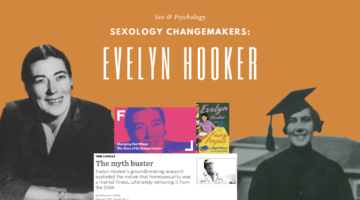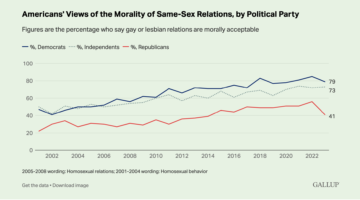Are Religiously Motivated People Able To Change Their Sexual Orientation?
March 31, 2014 by Justin Lehmiller
Historically and even today, many religious groups and organizations have promoted the view that any sexual activity outside the context of heterosexual marriage is immoral and harmful. One of the most vocal such groups in recent years has been the Church of Jesus Christ of Latter-day Saints (also known as LDS or Mormon). Not only have they spoken out against masturbation (e.g., consider this recent PSA likening a guy who doesn’t stop his college roommate from masturbating to leaving a wounded soldier on the battlefield), but they have also repeatedly communicated their belief that homosexuality is wrong (e.g., consider that they were one of the biggest financial backers of California’s 2008 same-sex marriage ban, Prop 8). In light of their views, it is perhaps not surprising that the LDS church has also been a big proponent of the idea that sexual orientation change is possible, and they have encouraged gay, lesbian, and bisexual members to seek treatment designed to alter their sexuality. So what happens to LDS church members who follow these directives to “convert” their sexual orientation? Are religiously motivated individuals able to successfully eliminate their feelings of attraction to members of the same sex?
In a new study published in the Journal of Counseling Psychology, researchers conducted an online survey of 1,612 adults, all of whom had been baptized into the LDS church and reported experiencing at least some same-sex attraction in their lifetime. The sample was predominately male (76%) with an average age of 37, and most participants lived in the United States (94%; about half of whom were from Utah). Participants were asked about their sexual history, how they coped with their same-sex attractions, and their current psychological well-being.
Most of the men (73%) and about half of the women (43%) reported having engaged in at least one attempt to change their sexual orientation. Most commonly, this involved attempted change through “personal righteousness” (e.g., reading bible verses, praying, and/or going to church more frequently). However, many also reported seeking church counseling, psychotherapy, group therapy, and/or support groups. Participants’ self-reported ratings of effectiveness for these treatments varied considerably; however, for all treatments considered in this study, a majority of participants reported that they were either ineffective or more harmful than helpful. The two most common methods of change (personal righteousness and church counseling) were generally regarded as the least effective and most harmful.
When comparing those who sought treatment for their sexual orientation to those who did not, there were no differences in current levels of same-sex attraction or frequency of adopting a gay or bisexual identity, suggesting that the treatments did little to change people’s sexuality. This was true for both male and female participants. In addition, it is worth noting that only one participant in this entire sample reported that they now had exclusive attraction to members of the other sex after undergoing treatment.
The researchers also found that those who had sought treatment to change their sexual orientation reported more current distress about their sexuality and (at least among men) lower self-esteem than those who had not sought such treatment.
Overall, these findings are consistent with a growing body of literature suggesting that efforts to willfully change one’s sexual orientation are generally ineffective and have the potential to do more harm than good—and this appears to be true even among those who are highly motivated to change their sexuality due to their religious beliefs.
Want to learn more about Sex and Psychology? Click here for more from the blog or here to listen to the podcast. Follow Sex and Psychology on Facebook, Twitter (@JustinLehmiller), or Reddit to receive updates. You can also follow Dr. Lehmiller on YouTube and Instagram.
To read more about this research, see: Dehlin, J. P., Galliher, R. V., Bradshaw, W. S., Hyde, D. C., & Crowell, K. A. (2014). Sexual orientation change efforts among current or former LDS church members. Journal of Counseling Psychology. Advance online publication. http://dx.doi.org/10.1037/cou0000011
Image Source: iStockphoto

Dr. Justin Lehmiller
Founder & Owner of Sex and PsychologyDr. Justin Lehmiller is a social psychologist and Research Fellow at The Kinsey Institute. He runs the Sex and Psychology blog and podcast and is author of the popular book Tell Me What You Want. Dr. Lehmiller is an award-winning educator, and a prolific researcher who has published more than 50 academic works.
Read full bio >


